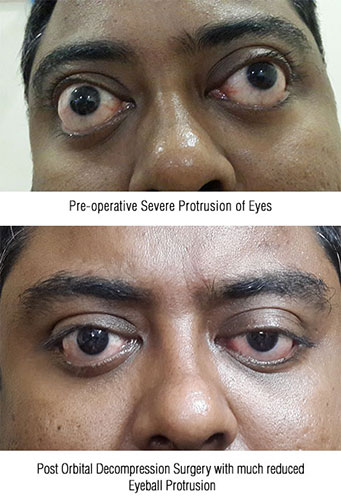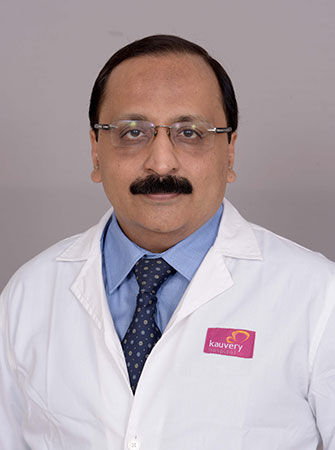
Problems of the thyroid gland are common, particularly in women. Each one of us knows at least one or more in our circle of friends and family who suffer from either over activity of the thyroid gland, or poor thyroid gland function. Thyroid gland conditions often result in a disease involving the eyes, called Thyroid Eye Disease (TED). This results in bulging of the eyes, a staring angry appearance, redness, dryness and puffiness around the eyes particularly in the mornings and in more severe cases, doubling of vision and even a drop in vision. Without timely diagnosis and treatment, Thyroid Eye Disease can result in irreparable loss of vision and even blindness.
The Thyroid Gland
This is a butterfly shaped specialized gland located in the front of the neck, that secretes thyroid hormone which is essential for health and well being. Production of too much hormone due to increased activity (Hyperthyroidism) or production of too little hormone due to its sluggish working (Hypothyroidism) results in loss of health and well being. Both hyperthyroidism and hypothyroidism are common. TED which is seen more commonly in hyperthyroidism can be surprisingly seen in people with normal thyroid activity (Euthyroidism) and at times even in hypothyroid individuals.
Warning Signs Of Thyroid Problems
In hyperthyroidism or overactivity of the thyroid gland, the person experiences rapid and unexplained weight loss, increased hunger and thirst. In addition, changes of skin texture especially over the legs, and generalized anxiety or fearfulness are often reported. Menstrual periods often become irregular. Such symptoms, when combined with a staring appearance of the eyes or bulging of the eyes raise a strong suspicion of hyperthyroidism.

In thyroid gland underactivity, the patient, more typically a woman will experience increased lethargy and weight gain despite reduced appetite and food intake, tendency of bloating of the face and tummy. Loss of hair and difficulty in tolerating cold weather or even air-conditioning are also noticed. The person also feels sleepy most of the time and this unfortunately results in the person being labelled as lazy. Irregular menstruation is frequently noted.
In euthyroid patients thyroid gland activity is normal and only the eye problems are seen.
How Serious Is The Problem Of Thyroid Eye Disease?
Thyroid eye disease can, in severe cases, result in blindness. Even today, it is unfortunate that due to poor awareness and lack of timely medical intervention, patients continue to lose vision and go blind. Being a progressive, at times relentless condition, it is easy to miss the warning signs, and loss of vision can take place without pain. Even those with the mildest forms of thyroid eye disease benefit greatly from expert advice and care under an Oculoplasty specialist. Studies have shown that surprisingly, the quality of life, as studied by detailed questionnaires, is more affected by Thyroid Eye Disease than in conditions like diabetes mellitus and even some cancers. Experienced and professional help goes a long way in greatly improving one’s physical and mental well being.
What treatment is available for TED?
Most of the times, TED is mild and all that is needed to make one comfortable is the use of lubricating eye drops at regular intervals. Good control of the thyroid state is vital. Being a self- limited disease, it ‘burns out’ and the eyes may get back to a near normal appearance.
In more severe degrees of eye involvement, use of oral or injectable steroid medications may be needed to control the swelling, pain, redness and reduce the pressure around the eye and on the eye nerve. This increased pressure results from thickened eye muscles and increased presence of fat around the eyes and results in bulging of the eyes, loss of vision or damage to the eye structures including the cornea, the clear transparent shiny structure at the front of the eye. The definitive treatment of this condition especially when sight is threatened involves a complex and sophisticated operation called orbital decompression which reduces the fat around the eyes and opens up the bones to relieve pressure on the nerve and eyes. This operation also restores the normal appearance of the eyes and face. Other surgeries like eye muscle surgery or eyelid correction for staring appearance may be needed later.
General advice for those with Thyroid Disease
- Consult your treating Physician/Endocrinologist at regular intervals as advised
- Do not alter the dose of advised medications on your own
- Thyroid disease often waxes and wanes. Keep your doctor informed of any special conditions or developments in your life, like pregnancy, or planned surgical operations
- Have a regular eye check, including eye pressure check as soon as thyroid gland disease is diagnosed and at regular intervals thereafter. In case you develop any of the described features of thyroid eye disease, your eye doctor will refer you to an experienced Oculoplasty specialist
- DO NOT SMOKE. Smoking seriously worsens thyroid eye disease. One must refrain from any exposure to cigarette or tobacco smoke like sitting in a restaurant or pub with smokers
Do’s and Don’ts for those with Thyroid Eye Disease
DO
- Regular eye checks and consultations with your Oculoplastic Surgeon
- Follow advised measures like use of medications, eye care advice
- Regular consultation with your Physician/ Endocrinologist to keep thyroid gland disease under tight control
- Follow diet and exercise advice
DO NOT
- Smoke
- Self medicate or change medications and dosages on your own
- Neglect follow up advised measures
- Ignore any eye pain, discomfort, redness, watering or drop in vision
- Ignore feelings of hopelessness, anxiety or depression.
About The Author

Dr. E. Ravindra Mohan, MBBS (AIIMS), MD (AIIMS), FRCS (ED)
The author, one of the country’s leading Oculoplastic & Orbital Surgeons, established India’s first Thyroid Eye Clinic at Sankara Nethralaya, Chennai . He has performed possibly the largest number of orbital decompression operations in the country. Since his association with Kauvery, he has performed a number of these operations successfully.

